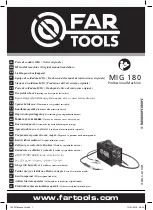
p
WARNINg! Ensure you read, understand and apply the safety instructions before use.
p
WARNINg! Before use, ensure the motorcycle to be lifted has a suitable structure and centre of gravity to accommodate the
lift saddle without damaging the bike.
DO NOT use if the lift will foul on the exhaust or other vulnerable parts. Remove any lower fairing and ensure the bike is
adequately strapped to the lift before operating.
4.1. Position the bike in a suitable area, checking that the surface on which the
lift will stand is solid and flat (not tarmacadam). Ensure that there is good
access and clearance beneath the bike for the lift to be wheeled under.
4.2. Position lift under bike so that the centre of gravity of the bike is over the
saddle, which must fit snugly against the underside of bike.
4.3. By depressing the lift pedal (fig.1E), raise the saddle up to the underside of
the bike.
4.5. Pump the lift pedal (fig.1E) to raise the load.
NOTE!
We recommend using
an assistant to steady the bike.
4.6. When the lift is being raised the safety bar will engage with one of the three
tabs on the frame so that the lift cannot be inadvertently lowered.
4.7. When the bike is at the desired height, lower it back down onto a tab,
secure the bike to the saddle through the three anchors on the main frame,
two being at the rear and the other being at the front of the lift. use the
three ratchet tie downs with loop straps
(not supplied)
to prevent
damage to body work. Hook one end of each tie down to the anchors on the
base of the lift, then secure the other end onto a solid non moving part of
the bike.
DO NOT
attempt to raise the bike before tie downs are secured.
4.8. When work is complete, check under the lift to ensure that there are no
obstructions and that it is safe to lower the unit.
Pump up once,disengage the safety bar from the frame tabs, secure the bar in the clip, (see fig.2H) whilst lowering and then
SLOWLY
press the release valve pedal to
GENTLY
lower the lift.
s
IMPORTANT:
speed of lowering is controlled by the release valve. the more the valve is opened the more rapidly the lift descends.
Ensure the descent is slow and controlled.
4.9. When the lift is fully lowered, ensure the bike is on its wheels and supported in the upright position. unstrap the bike from the lift, and
move the lift from under the bike.
4. OPERATINg INSTRUCTIONS
fig.2
p
WARNINg!
Keep your hands away from moving parts.
3.1. Assembly
3.1.1.
fit the castor wheels (fig.1A) to the main chassis with nuts and washers. fit
the fixed wheels to the opposite end of the frame with bolts and lock nuts.
3.1.2. fit safety bar by loosening main pivot bolts, carefully wind them inwards to
allow safety bar to be fitted (refer to fig.2B).
3.1.3. fit base of ram unit using two hex bolts.
3.1.4. fit top of ram by passing cotter pin through frame, ensuring recess goes to the
return spring side, (see fig.2c). secure by passing split pin through it, and
turning its ends over.
3.1.5. fit return spring by hanging from end of cotter pin, to 10mm bolt at the base of
the ram, (see fig.2D).
3.1.6. remove the 13mm bolt and fit the lift pedal by inserting the tube end and
secure with the bolt, (see fig.1E).
3.1.7. fit handle and secure by passing pin through the hole, and fitting clip over its
end, (see fig.1f).
3.2.
Before first use
3.2.1. Before using the lift, purge the hydraulic circuit. to eliminate any air in the
system, fully press the release valve pedal (fig.1G) while pumping the lift pedal
(fig.1E) 15 to 20 times.
3.2.2. test the lift, unladen, by raising it to its full height and then lowering it. Depress release valve pedal (fig.1G) slowly to control the rate of
descent.
fig.1
Original Language Version
© Jack sealey Limited
3. ASSEMBLY
Original Language Version
Mc402.V4 Issue: 2 (sP) - 16/07/13





















